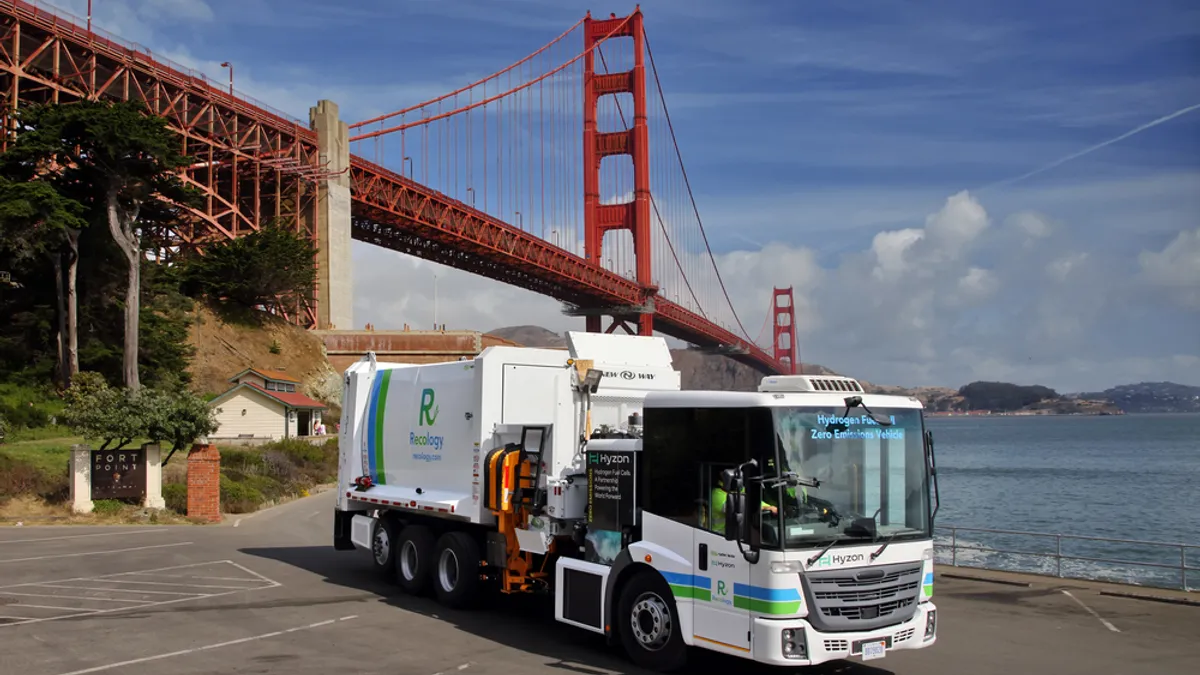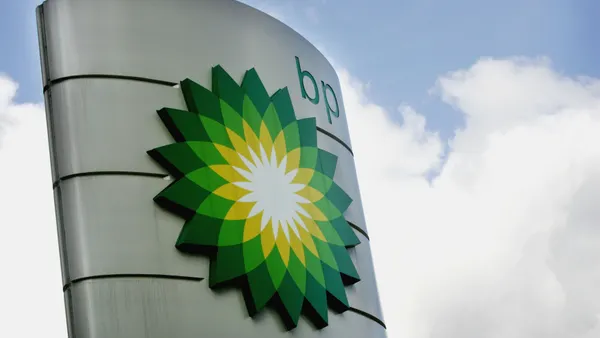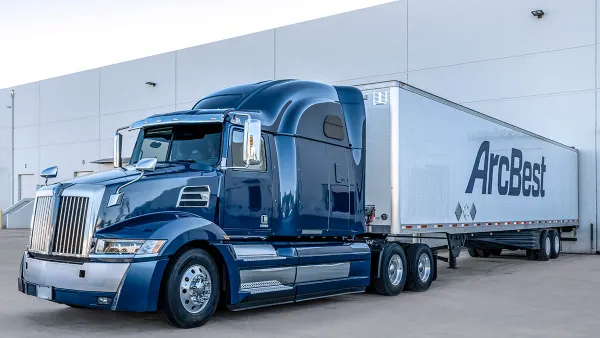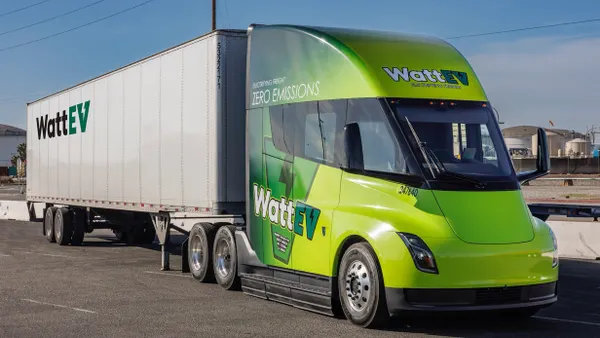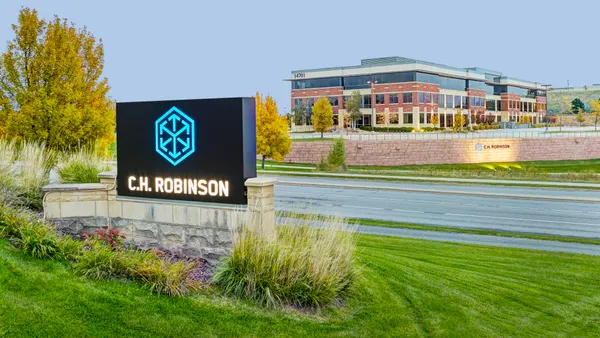Sal Coniglio, CEO of West Coast waste hauler Recology, is impressed by the hydrogen fuel cell truck his company is piloting.
Developed by hydrogen fuel cell manufacturer Hyzon and New Way Trucks, the vehicle is on a planned tour of cities in the U.S. and Canada, where the partners hope to generate support for a cutting-edge technology. Hyzon, in particular, is betting big on refuse vehicles in North America after it announced a strategic pivot away from international expansion plans earlier this year.
“The truck is exceeding our expectations. The drivers are very pleased with the productivity and the power of the truck,” Coniglio said in an interview Monday.
The companies say the two-week pilot is the first test of a hydrogen fuel cell-powered refuse collection vehicle in North America. Its debut comes as state and federal regulators around the country are pressuring waste haulers to decarbonize their fleets of collection vehicles, in turn placing pressure on manufacturers to deliver alternatives to fossil fuel-powered vehicles.
This is not the first time San Francisco-based Recology has piloted an early-stage vehicle. The waste hauler set a goal in 2018 to overhaul its roughly 2,600-vehicle fleet with models that used less carbon-intensive fuels. It achieved that goal four years later — alternative fuel vehicles now constitute 84% of its fleet. Recology has shifted in favor of CNG-powered and battery-electric vehicles, which reduced the hauler’s fuel emissions by more than 77% to date. The campaign also led it to partner with New Way to pilot a 100% electric collection vehicle in Seattle.
Coniglio said New Way introduced him to Hyzon. He visited the latter manufacturer’s facility outside of Chicago when the vehicle was still in development last year. He said he was eager to be among the first to test out the truck.
“Now we’re here testing it live. Like most waste companies, we want to see it in real time in collection and on route,” Coniglio said.
Range and specifications
The pilot began last month. Recology has used the truck on normal routes in San Francisco, putting it through a full day with about 600 residential waste bin lifts. The truck has so far tackled a 27% grade on the hilly city's streets.
Coniglio said the truck lasted multiple service days on a single fueling of its hydrogen tank. In contrast with battery-electric trucks Recology has used, the hydrogen fuel cell truck doesn't have an issue with heavy payloads, he said.
Currently, the hydrogen fuel cell vehicle costs approximately double what Recology pays for similar vehicles with different fueling systems, according to Coniglio. But he hopes the price will go down as more haulers begin to pilot and request the vehicles.
Fuel
Hydrogen fuel cells convert hydrogen gas into electricity to power a vehicle. The U.S. Department of Energy says such systems “are more efficient than conventional internal combustion engine vehicles and produce no harmful tailpipe emissions.” The Hyzon and New Way truck, like others of its type, emits water vapor and warm air from the tailpipe.
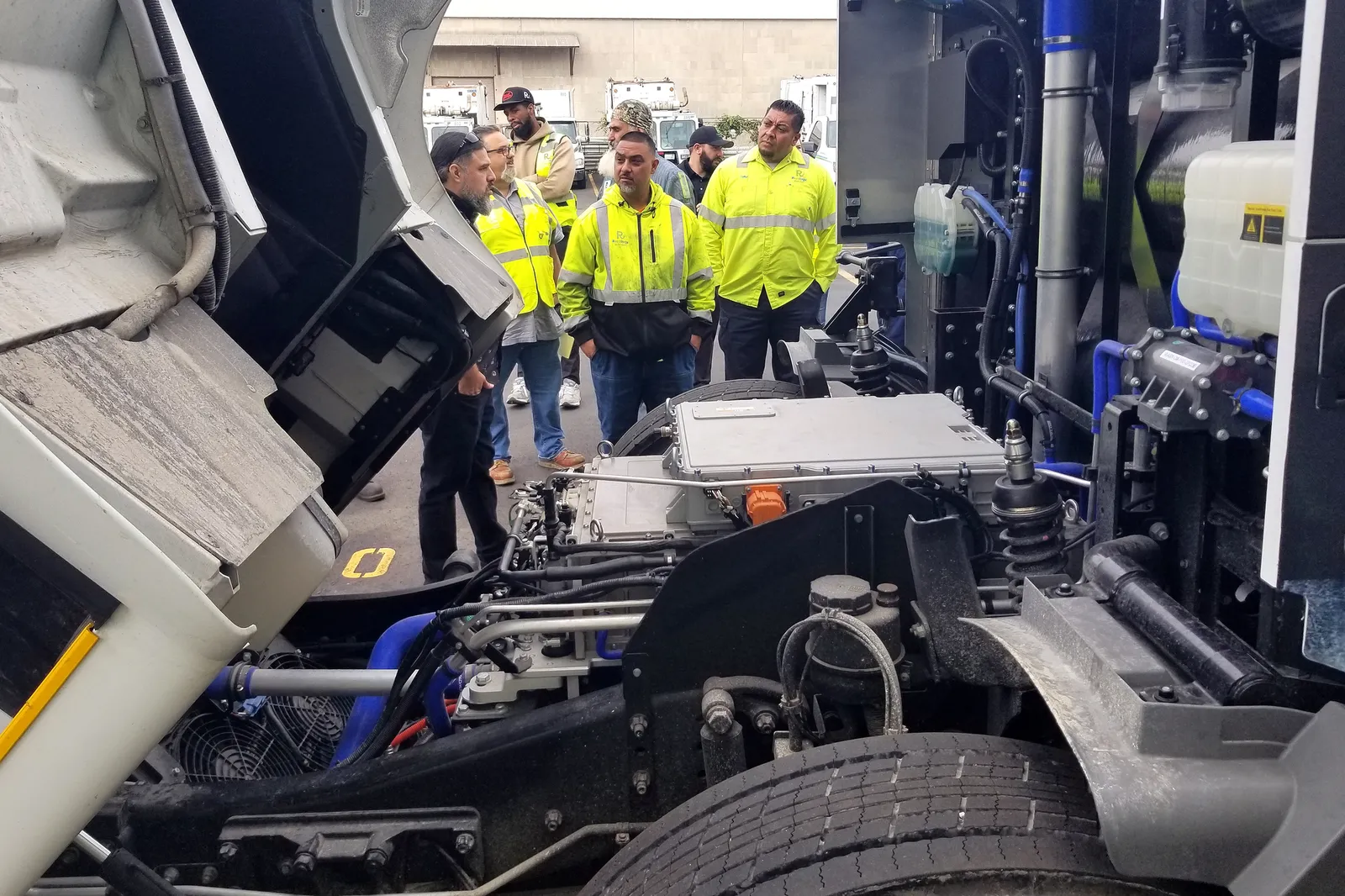
Hyzon said the fuel used in the Recology pilot was derived from natural gas. The source of hydrogen for use in fuels is a sticking point for environmentalists, as many argue any “alternative” fuels brought to market today should be displacing, rather than reinforcing, fossil fuel infrastructure. A spokesperson for Hyzon said the company is committed to supporting a “renewable hydrogen ecosystem.”
“Hyzon uses all efforts to source clean hydrogen and, if unavailable, works with customers on a clear plan to transition to it as clean hydrogen production increases,” Ismail Cidic, the spokesperson, said in an email.
Coniglio said Recology could begin producing hydrogen of its own to power fuel cell vehicles through landfill gas or organics processed via digestion.
“I see 30 years from now a fleet of hydrogen-electric trucks, but us producing our own hydrogen. That's where we want to go,” Coniglio said.
Future fleets
The truck currently in use in San Francisco will continue to be used in pilot programs through 2025. After that, Hyzon hopes to ramp up production and begin selling the vehicles to customers, according to a company spokesperson.
Coniglio said he expects the trucks will perform best in urban, residential environments. He said Recology operates in markets like San Francisco where existing fleets are already installing hydrogen fueling infrastructure, which makes access to the fuel less cumbersome. But he predicts cost of the vehicles, cost of the fuel and infrastructure availability generally will be the biggest barriers to adoption for hydrogen fuel cell vehicles.
Over time, he thinks waste hauling fleets will incorporate a range of fueling types compared to diesel’s domination in years past. Major policy drivers are facilitating that transition: California has adopted its Advanced Clean Fleets rule requiring heavy-duty waste collection vehicles to transition to zero-emission vehicles by 2042, and the U.S. EPA is also defending a rule in courts requiring heavy-duty truck manufacturers to reduce carbon emission intensity.
In the years to come, a collection of hydrogen fuel cell vehicles could coexist alongside battery-electric and natural gas-powered collection trucks, Coniglio said.
“I remember 25 years ago, having these exact same, or pretty similar, conversations when compressed natural gas rolled onto the scene,” Coniglio said. “We're taking a lot of that playbook and applying it to this situation here as well.”



